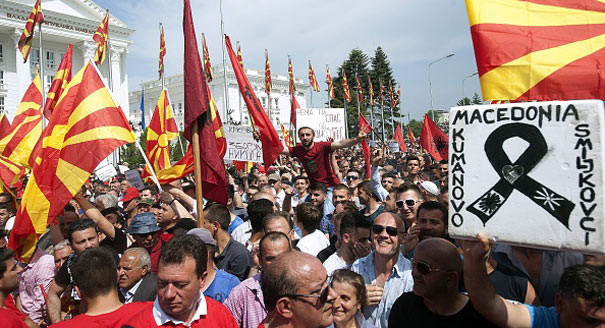Judy Dempsey
{
"authors": [
"Judy Dempsey"
],
"type": "commentary",
"blog": "Strategic Europe",
"centerAffiliationAll": "",
"centers": [
"Carnegie Endowment for International Peace",
"Carnegie Europe"
],
"collections": [
"EU Integration and Enlargement"
],
"englishNewsletterAll": "",
"nonEnglishNewsletterAll": "",
"primaryCenter": "Carnegie Europe",
"programAffiliation": "",
"programs": [],
"projects": [],
"regions": [
"Europe",
"Eastern Europe"
],
"topics": [
"EU",
"Democracy"
]
}
Source: Getty
Judy Asks: Are the Western Balkans Imploding?
A selection of experts answer a new question from Judy Dempsey on the foreign and security policy challenges shaping Europe’s role in the world.
A selection of experts answer a new question from Judy Dempsey on the foreign and security policy challenges shaping Europe’s role in the world.
Kurt BassuenerSenior associate at the Democratization Policy Council
The EU’s policy toward the Western Balkans has imploded. The underlying premise—that the carrot of enlargement alone would incentivize reforms leading to durable liberal democracies that could then join the union—has not delivered in most of the region. Each country has its own particularities, with Bosnia and Herzegovina’s constitutional structure based on the 1995 Dayton Agreement being just one of them.
Even prior to the 2015–2016 terrorist attacks and the migration crisis, stability was the paramount goal of Western policy. Leaders in the Western Balkans took this as a cue that they could get away with backsliding on democratic norms, as evidenced by declining press freedoms. Despite this, the EU continues to largely accentuate the positive—in Serbia, for example. The ongoing political crisis in Macedonia was also abetted by the West’s unwillingness to confront former prime minister Nikola Gruevski’s growing authoritarianism.
When the EU has been more direct in its ask and has worked not only with its partners in governments but also with civic actors and the full political spectrum to achieve durable adherence to democratic norms, it has been more successful. Albania’s rise from problem child to most improved in the class may in part be due to this approach. This isn’t a mandate problem, it’s a problem of political will.
Dimitar BechevDirector of the European Policy Institute in Sofia and visiting scholar at the Center for European Studies at Harvard University
The Western Balkans are not imploding, they are stagnating. Feeble democracies are sliding back, politicians who know how to talk the EU talk but only occasionally walk the walk are in charge, states are captured by special interests, the rule of law is elusive, media freedom is declining, economic growth is at best anemic, and societies are fragmented and demobilized. But then again, as the success of Vojislav Šešelj’s far-right Serbian Radical Party in the April 2016 parliamentary election in Serbia reminded observers, the situation could be much worse. And it was, in the 1990s.
The EU remains the region’s best bet, but the union’s transformative impact falls short of expectations. The migration crisis of 2015–2016 has made security, as opposed to reform, the paramount concern for Brussels and the EU member states.
Part of what counts as implosion could be a good thing. Citizen protests from Sarajevo to Skopje, from Prishtina to Podgorica, attest that a vocal minority is fed up with the status quo. If there is one lesson from enlargement, it is that being in the EU’s orbit is a necessary but not a sufficient condition for positive change. Only internal momentum can break the negative equilibrium. However, such momentum is still in short supply, and therefore the Western Balkans are stuck with the perverse effects of so-called stability.
Gordana DelicDirector of the Balkan Trust for Democracy, a project of the German Marshall Fund of the United States
No—at least, not yet.
Migration, Russian influence, and spillover from the Middle East are challenges that could potentially produce an ugly outcome when paired with domestic problems such as corruption, low living standards, high unemployment rates, and highly restricted media freedoms.
While all six Western Balkan countries are more or less firmly locked in the European integration process, their deepening domestic problems are creating a vacuum that, if left unfilled, will interfere with the region’s stability and security.
Current autocratic Balkan leaders have no real opposition but have been able to respond immediately to geopolitical challenges. It is therefore understandable that many EU and U.S. policymakers turn a blind eye to corruption and the lack of the rule of law.
However, keeping the Balkans on the right path and being able to count on the region as a partner requires serious domestic reforms. Civil society will be indispensable in the following years, as this is where the legitimate capacity is. Working with political parties on their own democratization processes, including by making their financing more transparent, is a huge missing piece in Balkan transitions. Equally important is the active support and engagement of the EU and the United States.
The Balkans are at a crossroads. The region is inches away from either becoming a true and trustworthy partner or backsliding into the old sentiments of nationalism and fake patriotism.
So much has been invested. It would be a shame to let it go.
Igor NovakovicResearch director at the International and Security Affairs Centre
If one looks at Balkan online news portals, the amount of negative news is overwhelming. Stories include the economic crisis, the possibility of a sovereign debt crisis, a brain drain, emigration, leaders’ autocratic tendencies, nationalism and populism, the erosion of media freedoms, and the rising influence of non-EU actors, to name just a few. They all give an impression that the region is imploding. As for the EU’s influence, it is limited due to the union’s own internal political and economic crisis.
However, even if a process of implosion is under way, it could prove to be more of a long-term tendency than an instantaneous event. The EU’s influence, as minor as it is at this point, should not be neglected. It gives the region a certain stability. Also, the presence of NATO guarantees that there will be no new armed conflicts. These two influences ensure at least the preservation of the outer shells of the Western Balkan states.
What the Western Balkans need is a new impetus from the EU. The Berlin Process that German Chancellor Angela Merkel initiated in 2014 with the aim of revitalizing multilateral ties between the region and EU member states is not enough. The best option would be an internally stable EU that is actively engaged in its neighborhood and with candidate countries. Without that, the region will continue to languish and its populations will continue to emigrate due to a lack of solutions to the economic and political despair.
Natasha WunschAssociate fellow at the German Council on Foreign Relations and PhD candidate at University College London
Following the violent disintegration of Yugoslavia during the 1990s, the Western Balkans earned themselves a reputation as Europe’s powder keg and a region on the brink of explosion. As recently as November 2015, German Chancellor Angela Merkel warned that a closure of the German border to refugees transiting along the Balkan route might spark military conflict in the region.
Yet, nowadays the real risk for the Balkans lies elsewhere. The stagnation of the EU accession process, coupled with grim economic prospects that push ever more young people to seek their fortunes elsewhere, may well favor a political collapse for which the EU and its member states would be partly responsible. Already, the rise of authoritarian tendencies across the region, most prominently in Macedonia and Serbia, is stifling a credible opposition and putting in peril the very democratic transition the EU has been seeking to foster through its enlargement policy.
To relaunch the reform process and live up to its commitment to the Western Balkans, the EU needs to strengthen its engagement with the region—not by supporting strong leaders as a bulwark against migrants but by delivering economic opportunities to the local populations and by favoring political pluralism.
About the Author

Nonresident Senior Fellow, Carnegie Europe
Dempsey is a nonresident senior fellow at Carnegie Europe
- Europe Needs to Hear What America is SayingCommentary
- Babiš’s Victory in Czechia Is Not a Turning Point for European PopulistsCommentary
Judy Dempsey
Recent Work
Carnegie does not take institutional positions on public policy issues; the views represented herein are those of the author(s) and do not necessarily reflect the views of Carnegie, its staff, or its trustees.
More Work from Strategic Europe
- Taking the Pulse: Can European Defense Survive the Death of FCAS?Commentary
France and Germany’s failure to agree on the Future Combat Air System (FCAS) raises questions about European defense. Amid industrial rivalries and competing strategic cultures, what does the future of European military industrial projects look like?
Rym Momtaz, ed.
- Macron Makes France a Great Middle PowerCommentary
France has stopped clinging to notions of being a great power and is embracing the middle power moment. But Emmanuel Macron has his work cut out if he is to secure his country’s global standing before his term in office ends.
Rym Momtaz
- How Europe Can Survive the AI Labor TransitionCommentary
Integrating AI into the workplace will increase job insecurity, fundamentally reshaping labor markets. To anticipate and manage this transition, the EU must build public trust, provide training infrastructures, and establish social protections.
Amanda Coakley
- Can Europe Still Matter in Syria?Commentary
Europe’s interests in Syria extend beyond migration management, yet the EU trails behind other players in the country’s post-Assad reconstruction. To boost its influence in Damascus, the union must upgrade its commitment to ensuring regional stability.
Bianka Speidl, Hanga Horváth-Sántha
- Taking the Pulse: Can the EU Attract Foreign Investment and Reduce Dependencies?Commentary
EU member states clash over how to boost the union’s competitiveness: Some want to favor European industries in public procurement, while others worry this could deter foreign investment. So, can the EU simultaneously attract global capital and reduce dependencies?
Rym Momtaz, ed.









